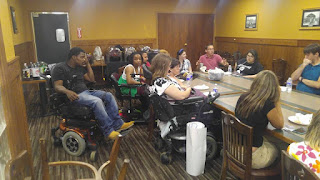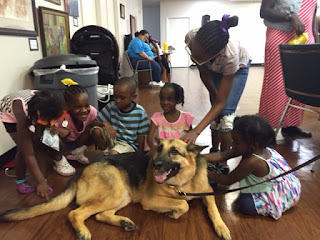Tennessee
Chapter of the National Federation of the Blind stands up for its members
By
Christina Clift
Members
of the National Federation of the Blind of Tennessee traveled to Murfreesboro to
support Mr. James Boehm and his guide dog Shep in court. They wanted to send a clear
message to Criminal Court Judge McFarland and to former Uber driver, Ms. Douglas
that guide dog users were no longer going to let discrimination go
unchallenged.
At
3:30 A.M. on Tuesday August 9, 2016, eight members of the Memphis chapter of
the National Federation of the Blind began a three and a half our trip to
Murfreesboro to meet members from other chapters and divisions of the NFB of Tennessee.
Everyone needed to arrive by 8:00 A.M. at the Rutheford County courthouse in
room 102, for the case of Rutheford County verses Ms. Rolonda Douglas. It would
be the first case of its kind because instead of being a civil prosecution,
this would be a criminal case.
On
April 28, 2016, Mr. Boehm and Shep were left stranded at an animal hospital in
Murfreesboro, TN. The Uber driver defiantly squealed away, refusing to
transport the guide dog team.
“I
was distraught and infuriated all at once!” stated Mr. Boehm, who filed a police
report with the Rutherford County sheriff’s department. After an investigation,
the state Attorney filed charges against Rolonda Douglas for violating the
Tennessee Access Law and scheduled her to appear in criminal court on August 9,
2016.
Similar
incidences have happened to other guide dog users and they have not been limited
to Uber drivers. Guide dog users have
been denied access to taxis, restaurants, housing complexes, and other public
facilities where they are allowed to be.
On
the evening of Friday July 15, 2016 a similar episode happened to Dr. Deborah
Carter and her guide dog George. Since
her air conditioning system was out and the temperature outside hovered around
95 degrees she scheduled a ride with Uber to travel from her home in Cordova to
a local hotel.
Her driver stated “It is
my right to deny you service.” He denied
her service because she was accompanied by George. Ironically, there was an article in the
Commercial Appeal the next day about Uber’s proposed settlement regarding a
lawsuit by the National Federation of the Blind. It outlined the proposed settlement and
Uber’s promise to have all of their drivers comply with the law.
Not
only does the Americans with Disabilities Act make it clear that people with
disabilities have a civil right to be accompanied by a service dog, Tennessee
statute 62.7.112 (The Tennessee Access Law) strengthens the ADA by providing
criminal penalties for discrimination. As a Class C misdemeanor, violating
the civil rights of a disabled person accompanied by a service dog is
punishable by up to 30 days in jail or a fine of up to $50.
When
Ms. Douglas’ name was called to appear in front of the judge, everyone who had
traveled to support James Boehm and Shep stood up. This included Dr. Deborah Carter and George,
along with a dozen Federationists.
“So
what option on the screen do you choose,” asked Judge McFarland after calling
Ms. Douglas’ case.
She
replied with “What are the charges?”
After
listening to the charges against her, Ms. Douglas chose to reset or continue
her case until September 20, 2016 so that she could obtain the services of a
lawyer. She looked slightly terrified as
she exited the courtroom.
Tara
Tate stated “that’s the power of what being in the National Federation of the
Blind means … we stand up for our members.”
The
National Federation of the Blind is the oldest and largest organization of the
Blind in the United States. The NFB knows that blindness is not the
characteristic that defines you or your future. Every day the NFB raises the
expectations of blind people because low expectations are the obstacles between
blind people and individuals dreams. You can live the life you want! Blindness
is not what holds you back. The Federation provides scholarships to blind
students; support for those who are blind or losing their eyesight; advocacy
for the blind facing discrimination; and educational programs for the general
public on topics of blindness. The NFB is not an organization that speaks on behalf
of the blind; we are the Blind speaking for ourselves.
Needless
to say, representatives from the National Federation of the Blind of Tennessee
will once again converge on Murfreesboro on September 20, 2016 to seek justice
on behalf of James Boehm and Shep, as well as all other guide dog users. This case is important because it will send a
message to all Uber, Lyft, and Taxi drivers that it is a criminal act to deny
service to people who use service animals in Tennessee.
_______________________________________
Text of the law in Tennessee *** Current through the 2016 Session ***
TENNESSEE CODE ANNOTATED (Tenn. Code Ann. § 62-7-112)
© 2016 by The State of Tennessee
All rights reserved.
Title 62 Professions, Businesses and Trades
Chapter 7 Hotels and Places of Public Accommodation
Tenn. Code Ann. § 62-7-112 (2016)
62-7-112. Dog guide to be admitted -- Penalties.
(a) (1) No proprietor, employee or other person in charge of any place of public accommodation, amusement or recreation, including, but not limited to, any inn, hotel, restaurant, eating house, barber shop, billiard parlor, store, public conveyance on land or water, theater, motion picture house, public educational institution or elevator, shall refuse to permit a blind, physically disabled or deaf or hard of hearing person to enter the place or to make use of the accommodations provided when the accommodations are available, for the reason that the blind, physically disabled or deaf or hard of hearing person is being led or accompanied by a dog guide. A dog guide shall be under the control of its handler. A place of public accommodation shall not require documentation, such as proof that the animal has been certified, trained or licensed as a dog guide.
(2) (A) No proprietor, employee or other person in charge of any place of public accommodation, amusement or recreation, including, but not limited to, any inn, hotel, restaurant, eating house, barber shop, billiard parlor, store, public conveyance on land or water, theater, motion picture house, public educational institution or elevator, shall refuse to permit a dog guide trainer to enter such place or to make use of the accommodations provided in those places, when the accommodations are available, for the reason that the dog guide trainer is being led or accompanied by a dog guide in training; provided, that the dog guide in training, when led or accompanied by a dog guide trainer, is wearing a harness and is held on a leash by the dog guide trainer or, when led or accompanied by a dog guide trainer, is held on a leash by the dog guide trainer; and provided, further, that the dog guide trainer shall first have presented for inspection credentials issued by an accredited school for training dog guides.
(B) (i) For purposes of this section, "dog guide in training" includes dogs being raised for an accredited school for training dog guides; provided, however, that a dog being raised for that purpose is:
(a) Being held on a leash and is under the control of its raiser or trainer, who shall have available for inspection credentials from the accredited school for which the dog is being raised; and
(b) Wearing a collar, leash or other appropriate apparel or device that identifies the dog with the accredited school for which it is being raised.
(ii) "Dog guide in training" also includes the socialization process that occurs with the dog's trainer or raiser prior to the dog's advanced training; provided, that the socialization process is under the authorization of an accredited school.
(3) A place of public accommodation may ask a person to remove a dog guide or dog guide in training from the premises if:
(A) The dog guide or dog guide in training is out of control and its handler does not take effective action to control it; or
(B) The dog guide or dog guide in training is not housebroken.
(b) A violation of this section is a Class C misdemeanor.






